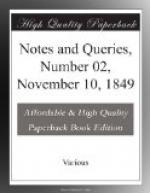Yours, &c.
A. G. C.
[The Editor inserts this letter because he is sure that it comes from a friendly quarter, and he knows that something like what it suggests is very much wanted. He would feel great diffidence as to his powers of fulfilling all that might be expected if he were simply to reply in the affirmative: but he is quite willing to make the trial, and he thinks that (though sometimes perhaps with a little delay) he could in general obtain any information of this kind which could be reasonably sought.]
* * * * *
LINES IN THE STYLE OF SUCKLING.
Mr. Editor,—The following lines are written in pencil on sheet 61. of the Notes of the Debates in the Long Parliament, taken down in the House of Commons by Sir Ralph Verney. The Notes of Debates, but not these lines, were published by the Camden Society in 1845. For any thing that appears to the contrary, these lines may have been written in the House as well as the Notes of Debates. The sheet 61. refers to debates which took place in March 1641-2. I am not aware that the lines have been published, nor can I assign them to their author. If any of your readers can tell me anything about them, I shall esteem it a favour.
Wert thou yet fairer than thou art,
Which lies not in the power
of art;
Or hadst thou, in thine eyes, more darts
Than Cupid ever shot at hearts;
Yet, if they were not thrown at me,
I could not cast one thought
at thee. {21}
I’d rather marry a disease
Than court the thing I cannot
please;
She that will cherish my desires,
Must feed my flames with equal
fires.
What pleasure is there in a kiss,
To him that doubts the heart’s
not his?
I love thee, not ’cause thou art
fair,
Smoother than down, softer
than air,
Nor for those Cupids that do lie
In either corner of thine eye;
Will you then know what it may be?
’Tis—I love
you ’cause you love me.
J. BRUCE.
24th Oct. 1849
* * * * *
NOTES UPON ANCIENT LIBRARIES.
A knowledge of the intellectual acquirements of the middle ages must be mainly formed upon a consideration of the writings which directed them, or emanated from them. Unfortunately such materials are very imperfect, our knowledge of the existence of works often resting only upon their place in some loosely-entered catalogue—and of the catalogues themselves, the proportion still remaining must be small indeed. Under these circumstances the following documents, which are now for the first time printed, or even noticed, will be found to be of considerable interest. The first is, in modern language, a Power of Attorney, executed by the Prior of Christ Church, Canterbury, appointing two of the monks of his church to be his procurators for the purpose of receiving from the convent of Anglesey, in Cambridgeshire[1], a book which had been lent to the late Rector of Terrington. Its precise date is uncertain, but it must be of about the middle of the thirteenth century (1244-1254), as Nicholas Sandwich, the Prior of Christ Church, was the second of four priors who presided between the years 1234 and 1274.




